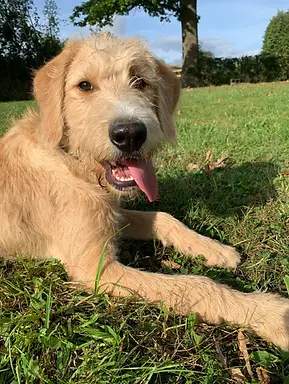






At Kiss-A-Doodle, we are dedicated to raising healthy and happy F1 labradoodle puppies. We are a small time breeding family with a love for animals. We live on a 2 1/2 acre parcel of land, with about 1/2 acre of grass. We are a family of 7 with 5 children who love to laugh and play with our adorable little furballs. We strive for exceptional breeding practices to ensure you get the perfect addition to your family. Located in Tonopah, NV, Kiss-A-Doodle takes pride in raising quality labradoodle puppies. We prioritize health and temperament, offering a reservation system that ensures each puppy finds the right home, backed by a contract and a deposit to secure your new furry friend.


F1 Standard Labradoodles
What is an "F1" Standard Labradoodle?
Hybrid dog breeding involves various generations, each with specific characteristics. The terms F1 and F1b are used to denote the generational difference in Labradoodles, which can significantly affect their appearance, temperament, and health.
F1 Labradoodles: The First Generation
An F1 Labradoodle is the first-generation offspring of a purebred Poodle and a purebred Labrador Retriever, making them 50% Poodle and 50% Labrador. These dogs often exhibit a mix of traits from both parent breeds.
Physical Characteristics:
-
Coat Type: F1 Labradoodles can have a variety of coat types, from wavy to curly. They are less predictable in terms of coat texture and shedding, with some individuals shedding more than others.
-
Size and Weight: They typically range from medium to large, depending on the size of the parent breeds. Standard F1 Labradoodles can weigh between 50 to 65 pounds.
Temperament Traits:
-
F1 Labradoodles tend to be friendly, intelligent, and good-natured. They often inherit the Labrador’s sociability and the Poodle’s intelligence.
Pros and Cons:
-
Pros: The genetic diversity in F1 Labradoodles often results in hybrid vigor, which can lead to fewer inherited health issues. They are usually friendly and adaptable.
-
Cons: Their coat type and shedding can be unpredictable, which might not be ideal for allergy sufferers.
F1b Labradoodles: The Backcross
An F1b Labradoodle is a backcross between an F1 Labradoodle and a purebred Poodle, making them 75% Poodle and 25% Labrador Retriever. This generation aims to enhance certain desirable traits, particularly the hypoallergenic coat.
Physical Characteristics:
-
Coat Type: F1b Labradoodles are more likely to have a curly or wavy coat, with significantly reduced shedding compared to F1 Labradoodles. Their coat is often more predictable and consistent.
-
Size and Weight: Similar to F1 Labradoodles, but with a slight variation depending on the Poodle parent’s size. They typically weigh between 40 to 55 pounds.
Temperament Traits:
-
They tend to inherit more Poodle traits, making them intelligent, easy to train, and slightly more reserved than F1 Labradoodles.
Pros and Cons:
-
Pros: They are more likely to be hypoallergenic, making them a better choice for families with allergies. Their coat is easier to predict and manage.
-
Cons: They may inherit more Poodle-like characteristics, which might not appeal to those looking for a stronger mix of Labrador traits.
Key Differences Between F1 and F1b Labradoodles
Coat Type and Grooming Needs:
-
F1 Labradoodles can have a variety of coat types, including straight, wavy, or curly. They require regular grooming but may shed more.
-
F1b Labradoodles usually have curlier coats that shed less, requiring frequent grooming to prevent matting.
Hypoallergenic Qualities:
-
F1 Labradoodles may not be as hypoallergenic as F1b Labradoodles, making the latter a better option for allergy sufferers.
Temperament and Behavior:
-
F1 Labradoodles often exhibit a balance of Labrador and Poodle traits, making them versatile family pets.
-
F1b Labradoodles may show more Poodle-like behaviors, including a higher level of intelligence and sometimes a more reserved nature.
Health Considerations:
-
Both generations are generally healthy, but F1 Labradoodles benefit from hybrid vigor, reducing the likelihood of inherited health issues. F1b Labradoodles, being a backcross, can sometimes have a higher risk of inheriting Poodle-specific health problems.
Choosing the Right Labradoodle for Your Family
When deciding between an F1 and F1b Labradoodle, consider the following factors:
Lifestyle and Living Environment:
-
Active families with ample space might prefer an F1 Labradoodle for its versatile traits and energy levels.
-
Smaller living spaces or homes with allergy sufferers might find the F1b Labradoodle’s predictable coat and hypoallergenic qualities more suitable.
Allergies and Sensitivity to Pet Dander:
-
F1b Labradoodles are a safer bet for those with allergies due to their higher Poodle genetic influence.
Desired Coat Type and Grooming Commitment:
-
If you’re okay with some shedding and less frequent grooming, an F1 Labradoodle could be a good fit.
-
For a more hypoallergenic coat and regular grooming routines, opt for an F1b Labradoodle.
Activity Level and Companionship Needs:
-
Both generations are friendly and intelligent, but F1 Labradoodles may require more physical activity and mental stimulation.
Conclusion
Choosing between an F1 and an F1b Labradoodle depends on your personal preferences, living situation, and any specific needs such as allergy concerns. Understanding the key differences in coat type, temperament, and health can help you make an informed decision. Both types of Labradoodles offer wonderful companionship and bring joy to any home.
-All About The Doodles




Advantages of F1 Labradoodles

Good Temperament

Decreased Health Risks

Service Dogs
F1 Labradoodles tend to be friendly, intelligent, and good-natured. They often inherit the Labrador’s sociability and the Poodle’s intelligence.
The genetic diversity in F1 Labradoodles often results in hybrid vigor, which can lead to fewer inherited health issues. Above that of Labrador Retrievers, Poodles, and even other mixes of Labradoodles.
F1 Labradoodles are well-suited to be service dogs due to the combined traits of their parent breeds, the Labrador Retriever and Poodle, inheriting intelligence, trainability, and a friendly, eager-to-please temperament.








